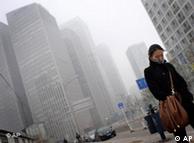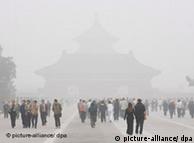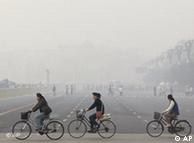领导呼吸新鲜空气是百姓之福?
据德新社报道,多年来很多中国人都感到惊讶,北京的空气质量这么差,为什么中央的领导们却袖手旁观呢?他们不是要呼吸同样脏的空气吗?不过直到现在这些老 百姓才了解到,这些"劳心者"们活动的区域空气已经得到有效地净化了。在党的高官干部们办公和生活的场所安装了远大集团生产的空气净化机。
德新社的报道称,远大在公司网页上曾登载了一篇"远大空气净化机成功案例-中南海篇"。这篇广告软文中称,远大空气净化机走进"中国政治生活的心脏";称"远大净化机为国家领导人创造了健康,清新的办公环境,是百姓之福"。
很难想象北京2000万市民听到这样的广告词会作何感想。每年一到供暖季节开始,北京市民就得开始忍耐雾霾天气。卫生部门通报说,由于空气污染严重,呼吸道疾病以及心血管疾病发病率都明显升高。在某些空气严重污染的日子,医生警告市民尽可能避免出门。
很多北京市民对于领导干部们享受特供菜、干部医院、干部子女学校感到不满,现在他们知道了,连空气干部们都可以享受"特供"的。
这篇"成功案例"中还写道:"远大净化机除异味的效果和优雅的外观获得了领导的一致好评。现场清洗净化机时,当看到像墨汁一样的脏水,远大净化机的功效在中南海领导人心中已经确信无疑了。远大净化机终于成为国家领导人指定用空气净化机!"
出于谨慎的考虑,远大公司没有证实国家领导人办公和生活住所安装空气净化机的消息是否属实。但是远大公司发言人在接受德新社问询时回应说:"我们的客户当 中的确包括很多政府部门。"现在写有"远大空气净化机在中央政府部门的使用是对呼吸健康,环保的新生活理念的极大支持与推广"的"成功案例"已经从远大的 网页上消失了。
但是对于北京普通市民来说,面对严重的空气污染,他们却束手无策。一位网民在网上写道:"只有党和国家领导人以及他们的家人也吃被污染的食品,也喝被污染的水,也喘被污染的气的时候,我们才有希望真正改善空气质量。"
美国驻华使馆监测北京空气质量发出严重污染警告时,北京环保局却轻描淡写成"轻度污染",引起民众的强烈不满。
按照世界卫生组织所建议的,美国驻华使馆对空气中的细颗粒物(PM2.5),也就是大气中直径小于或等于2.5微米的颗粒物进行监测。而北京市环保局监测 的是PM10,也就是粒径小于等于10微米的颗粒物。北京市环保局副局长杜少中上周在接受北京一家媒体采访时说:"我不清楚他们(美国驻华使馆)的监测手 段和方法,如何保证准确性。但我觉得他们公布的方式更像是炒作,不是很严谨的做研究的态度。"
信息来源:德新社编译:洪沙
责编:乐然
The Privileges of China’s Elite Include Purified Air
By ANDREW JACOBS
Although Beijing has been slow to address its poor air quality, the upper ranks of the Communist Party have been protecting themselves with high-end air purifiers.
China's Communist party Searching for its softer side
Oct 22nd 2011, 10:33 by J.M. | BEIJING
 IN THE past several days, China has been doing much soul-searching. More than 300 of the Communist Party’s most powerful leaders met in Beijing and discussed ways of boosting the nation’s “cultural soft power”: an admission that for all the country’s economic prowess it lacks the magnetic draw of a country like America. Ordinary Chinese, however, have been more preoccupied with a hit-and-run accident that caused the death of a two-year-old girl. A dearth of what one Chinese newspaper commentary called “moral soft power” has been widely blamed for her demise and the seeming cold-heartedness of passersby.
IN THE past several days, China has been doing much soul-searching. More than 300 of the Communist Party’s most powerful leaders met in Beijing and discussed ways of boosting the nation’s “cultural soft power”: an admission that for all the country’s economic prowess it lacks the magnetic draw of a country like America. Ordinary Chinese, however, have been more preoccupied with a hit-and-run accident that caused the death of a two-year-old girl. A dearth of what one Chinese newspaper commentary called “moral soft power” has been widely blamed for her demise and the seeming cold-heartedness of passersby.
The party’s meeting from October 15th to 18th was the first annual conclave of its central committee to focus on the issue of cultural soft power (a term that came into official party use after President Hu Jintao used it in a speech in 2007). The resolution it adopted (in Chinese) spoke of an urgent need to build up such power, which Joseph Nye, an American scholar, first drew attention to 20 years ago as a component of national strength. A country with soft power, Mr Nye contended, could bend others to its will without resorting to force or payment. “Success depends not only on whose army wins, but also on whose story wins,” wrote Mr Nye in 2005 (in what, from the party’s perspective, was a remarkably bullish article about the gains China appeared to be making in developing soft power).
The story of Little Yue Yue, as the Chinese media have nicknamed Wang Yue, who died on October 21st as a result of the accident eight days earlier in the southern city of Foshan, has been anything but a winning one. To many Chinese commentators, it has revealed a widespread callousness fostered by an amoral pursuit of wealth. Footage of the accident caught by a surveillance camera (be warned it is harrowing) showed Little Yue Yue being hit by a van, which stops and pauses, only to run over her again with a rear wheel, as its driver decides to proceed without checking what has happened. A little later a lorry rolls over her injured body. In the space of seven minutes, no fewer than 18 people walk by the bloody but still living girl before a rubbish-cleaner finally tends to her and summons Wang Yue’s mother.
The incident has triggered widespread soul-searching, with even the state-run media wringing their hands over the state of Chinese society. “These last few days the whole of China has been asking itself: is this just the way people are by nature? or have they only fallen to this state as a result of prolonged damage to their public morals?” asked one commentary in Southern Weekend, a newspaper (in Chinese). The answer, most analysis has concluded, is the latter. Caixin, a magazine, published an article on its website suggesting that China’s political culture might even be to blame. “At the same time as people’s rights have been suppressed, people’s sense of righteousness and justice has been restrained too,” it said (in Chinese).
This outpouring began even before the central committee wrapped up its typically secretive meeting. The furore thus created a problem for the party’s propagandists. The central committee’s resolution may have implied that China was lagging behind in the development of soft power, but officials certainly did not intend to signal that China was in a state of moral collapse. The party’s main mouthpiece, the People’s Daily, tried to rally enthusiasm with a commentary on October 18th saying the meeting had ended “victoriously” and that the party had already succeeded in “raising the ideological and moral qualities as well as scientific and cultural qualities of the entire nation”. Little Yue Yue’s mourners have begged to differ.
There has, however, been another development in recent days that, while no less embarrassing to the party, paints a different picture of Chinese civic consciousness. An online campaign to draw attention to the plight of Chen Guangcheng, a blind activist in rural Shandong Province, has also drawn widespread attention in China (for the view of one Beijing-based supporter, Song Zaimin, see this post in Chinese).
Mr Chen and his family have been kept under virtual house arrest since his release from prison a year ago, with thugs deployed by local officials to keep visitors, especially supporters and journalists, away. The New York Times published a fine account of how, inspired by online reports of Mr Chen’s suffering, admirers have been making their way to his village to see him in what the newspaper called “a rare wave of civil disobedience”. It described how one group of disabled people drove from the neighbouring province of Anhui, only to be stopped at the village by guards.
On this issue too, some Chinese newspapers have broken ranks with the party. “Blocking information and hoping the inquiries go away will only lead to worse consequences,” said the Global Times, a Beijing daily. Some see signs that the internet campaign might be working, a bit. The Wall Street Journal reports that Mr Chen’s daughter is now being allowed to go to school. If China would ease up on all its dissidents, its soft power would stand a far better chance of growing.
A Chinese woman walks past the Central Business District buildings shrouded by heavy fog in Beijing, China, Wednesday, Nov. 25, 2009. (AP Photo/Andy Wong)
顆粒物,你見,或者不見我,我就在那裡
北京恐怕是全球空氣污染最嚴重的大都市之一。不過在喘氣的問題上,不是讓領導先喘,而是讓領導"優先喘"。在中南海辦公的領導人們享受著經過過濾的干淨空氣。而對普通民眾公佈的空氣質量監控數據已經得到"美化"。
據德新社報導,多年來很多中國人都感到驚訝,北京的空氣質量這麼差,為什麼中央的領導們卻袖手旁觀呢?他們不是要呼吸同樣臟的空氣嗎?不過直到現在這些老百姓才了解到,這些"勞心者"們活動的區域空氣已經得到有效地淨化了。在黨的高官幹部們辦公和生活的場所安裝了遠大集團生產的空氣淨化機。
德新社的報導稱,遠大在公司網頁上曾登載了一篇"遠大空氣淨化機成功案例-中南海篇"。這篇廣告軟文中稱,遠大空氣淨化機走進"中國政治生活的心臟";稱"遠大淨化機為國家領導人創造了健康,清新的辦公環境,是百姓之福"。
ARCHIV - Passanten gehen in Beijing durch eine dichte Smogschicht (Achivfoto vom 26.10.2007). China geht mit einer neuen Strategie in die Verhandlungen über die Begrenzung der Treibhausgase. Statt wie früher defensiv zu argumentieren, dreht die viertgrößte Wirtschaftsmacht den Spieß um und geht offensiv mit Maximalforderungen in die Gespräche über ein Nachfolgeabkommen für das Kyoto-Protokoll nach 2012. Selbstbewusst fordert China die wohlhabenden Staaten auf, ihre Treibhausgase bis 2050 nicht nur um 50 Prozent, sondern vielmehr um 80 bis 95 Prozent verringern. Foto: Diego Azubel (zu dpa -Themenpaket zur UN-Klimakonferenz in Posen vom 20.11.2008) +++(c) dpa - Bildfunk+++
很難想像北京2000萬市民聽到這樣的廣告詞會作何感想。每年一到供暖季節開始,北京市民就得開始忍耐霧霾天氣。衛生部門通報說,由於空氣污染嚴重,呼吸道疾病以及心血管疾病發病率都明顯升高。在某些空氣嚴重污染的日子,醫生警告市民盡可能避免出門。
很多北京市民對於領導幹部們享受特供菜、幹部醫院、幹部子女學校感到不滿,現在他們知道了,連空氣乾部們都可以享受"特供"的。
這篇"成功案例"中還寫道:"遠大淨化機除異味的效果和優雅的外觀獲得了領導的一致好評。現場清洗淨化機時,當看到像墨汁一樣的髒水,遠大淨化機的功效在中南海領導人心中已經確信無疑了。遠大淨化機終於成為國家領導人指定用空氣淨化機!"
出於謹慎的考慮,遠大公司沒有證實國家領導人辦公和生活住所安裝空氣淨化機的消息是否屬實。但是遠大公司發言人在接受德新社問詢時回應說:"我們的客戶當中的確包括很多政府部門。"現在寫有"遠大空氣淨化機在中央政府部門的使用是對呼吸健康,環保的新生活理念的極大支持與推廣"的"成功案例"已經從遠大的網頁上消失了。
但是對於北京普通市民來說,面對嚴重的空氣污染,他們卻束手無策。一位網民在網上寫道:"只有黨和國家領導人以及他們的家人也吃被污染的食品,也喝被污染的水,也喘被污染的氣的時候,我們才有希望真正改善空氣質量。"
美國駐華使館監測北京空氣質量發出嚴重污染警告時,北京環保局卻輕描淡寫成"輕度污染",引起民眾的強烈不滿。
按照世界衛生組織所建議的,美國駐華使館對空氣中的細顆粒物(PM2.5),也就是大氣中直徑小於或等於2.5微米的顆粒物進行監測。而北京市環保局監測的是PM10,也就是粒徑小於等於10微米的顆粒物。北京市環保局副局長杜少中上週在接受北京一家媒體採訪時說:"我不清楚他們(美國駐華使館)的監測手段和方法,如何保證準確性。但我覺得他們公佈的方式更像是炒作,不是很嚴謹的做研究的態度。"
信息來源:德新社編譯:洪沙
責編:樂然




沒有留言:
張貼留言